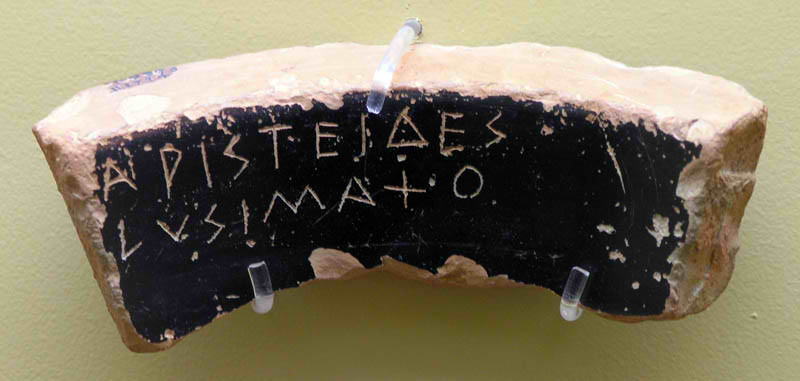By Van Bryan
In The Politics, Aristotle tells us that ostracism was originally instituted as a means to allow the common people to check the power of the political players who had grown too powerful too fast and were abusing their position.
It was a way to give claws to the hare when he was going up against a lion.
|
The procedure was rather simple. Plutarch tells us, in his Life of Aristides, that an ostracism vote was held once a year. The citizens were given the opportunity to write the name of any political figure on a shard of pottery. Should any one name get 6000 votes, then that man was banished from Athens for ten years.

An ostracism vote with “Aristides” written on it
It is worth noting, however, that after the ten years, the man was welcomed back with open arms and all of his citizenship rights were renewed. Also, during the ten years, a man could still profit from whatever properties he owned back in Athens.
|
This is why we can’t have nice things
While ostracism was intended as a check on the power of the political elite, Aristotle seems to suggest that it was used as a tool of retribution, a means for jealous men to do away with their political rivals. Aristotle writes that ostracism “has not been fairly applied in states; for, instead of looking to the public good, they have used ostracism for factious purposes.”
And there might be some truth to that. Some rather impressive figures from classical Athens fell victim to ostracism. Among them was Themistocles, the general most credited with saving Athens from the Persian army of Xerxes in 480 BC, and Thucydides, the author of the celebrated History of the Peloponnesian War.
“You embezzled public money? Embroiled in another sex scandal?
Well, see ya in a decade…”
So just like most political tools intended for the public good, ostracism might have been hijacked and manipulated by self-serving politicians.
You see, this is why we can’t have nice things.
Even with that possibility, I’m still rather fond of the idea of bringing back ostracism in 21st century politics. At the very least it might give the crooks and the phonies something to sweat about.
The next time a congressman is caught with his trousers around his ankles, or a senator’s account balance seems to be a bit more flushed then it should be, we wouldn’t have to worry about them finding their way to that revolving door.
Instead, we pack their bags for them and hand them a one-way ticket out of town. We don’t care where you go, but you can’t stay here.
But now here’s the real question. Who would take them?









One comment
Very well-written article. I enjoyed it.
Our apologies, you must be logged in to post a comment.